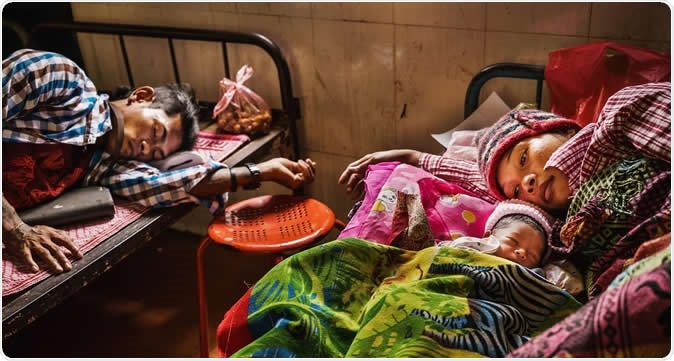A new study led by the World Health Organization (WHO), published in The Lancet on October 9, 2019, reveals that women in four poorer countries are at risk of being ill-treated if they visit hospitals or other medical facilities for childbirth.

Image Credit: WHO
Shockingly, up to one in three women described physical abuse, verbal insults, unequal or unfair treatment, being shamed or ostracized, failure to obtain their consent before performing medical procedures, forcible performance of procedures, and neglect or even the experience of being abandoned by medical assistants.
Historically, maternal health data has been evaluated for the competence of the technology to save lives or improve physical health. However, the present paper focuses on more subtle indicators of quality maternity care, including the woman’s perception of how she is treated. This comprises terms like compassion, dignity, respect and emotional support. Lack of these qualities while caring for women during labor and childbirth produce feelings of distress, fear, and avoidance of future contacts with health professionals in the women being treated, and therefore this paper is overdue.
The WHO stands for respect towards women while taking care of them in pregnancy and postpartum. This is defined, in the guidelines, as care which provides “dignity, privacy and confidentiality, ensures freedom from harm and mistreatment, and enables informed choice and continuous support during labour and childbirth.” In order to do this, it is also essential to identify what drives this type of mistreatment during a particularly challenging time of womanhood.
The current study was aimed at developing an assessment tool for mistreatment of women during childbirth, built on reliable evidence and validated appropriately. Both observation and surveys of the women involved were carried out and compared to produce a validated measurement approach for this aspect of maternity care.
The problems
The countries examined in this study were Ghana, Guinea, Myanmar, and Nigeria. All the women were at least 15 years old, and three medical facilities in each country were identified for the study.
The researchers observed labor and childbirth in the first set of over 2000 women from the time of admission to 2 hours postpartum. In this group, no studies were done in Myanmar. Of the women who were directly observed during labor and childbirth, almost 840 women were mistreated during their deliveries, with 14% being physically assaulted – slapping, hitting or punching. The greatest abuse was during the period of 30 minutes before to 15 minutes after the birth. This may reflect the increased presence of medical staff at this time, or the increased stress levels in the healthcare providers related to case overload or the need for greater clinical skills to manage childbirth as well as its complications. The commonest defense for such behavior by the providers was the “uncooperative” behavior of the women and the provider’s concern for fetal wellbeing.
The medical procedures performed without consent included Cesarean sections (13% of the total), episiotomies (75% of the total) and vaginal examinations (almost 60%). Inability to pay the bills led to about 5% of the women or their babies being detained in the medical center. Oral fluids were not available in about 40% of cases. Most women in Nigeria and Ghana were not offered the freedom to move about freely during labor and did not do so. Almost no woman was asked about her preferred birth position (95%) and the dorsal or lithotomy positions, or supine position, was adopted in all cases. Simple privacy curtains were not available at all in over 37% of cases, and used only at times in another 11%. Pain relief was asked for by only 7% of women, but almost 34% of these did not receive any. Of the 113 perineal repairs performed, 14% were done without anesthetizing the region.
The second group of women surveyed after childbirth came from the community and included women up to 8 weeks post-delivery. Almost identical results were obtained from the analysis of these postpartum interviews conducted with about 2700 women in these countries.
Women who were younger (below 19 years) and had less education were primary targets of mistreatment. The chances of being verbally insulted were at least 3.6 and 1.6 times higher in uneducated women and poorly educated women respectively.
The solution
The paper details several strategies to handle this severely flawed system.
- For one, it recommends that accountability be enforced on health systems with respect to their treatment of women in labor and childbirth, as well as providing clear policies on this matter.
- They also advise that medical professionals be given training and follow-up to ensure they act properly towards the women they treat, with dignity as well as compassion.
- More sweeping recommendations include changing labor wards to provide more privacy and facilities for companions during labor – for instance, providing inexpensive washable curtains to screen individual patients in these wards and providing drinking water
- Making informed consent a must before any medical intervention
- Educating the public to expect and require professional standards of care for expectant and new mothers, centering around the woman’s needs at this time, and with zero-tolerance for mistreatment
- Building support among professional associations to promote respectful maternity care among all those concerned with this area
- Setting up a reliable and consistent system to identify and report mistreatment during childbirth, as well as to take appropriate action against it locally
Source:
Journal reference:
How women are treated during facility-based childbirth in four countries: a cross-sectional study with labour observations and community-based surveys Bohren, Meghan A et al. https://www.thelancet.com/journals/lancet/article/PIIS0140-6736(19)31992-0/fulltext